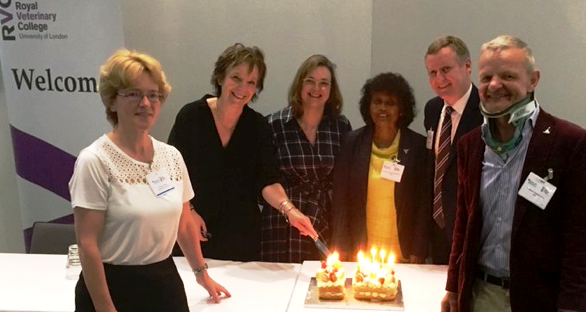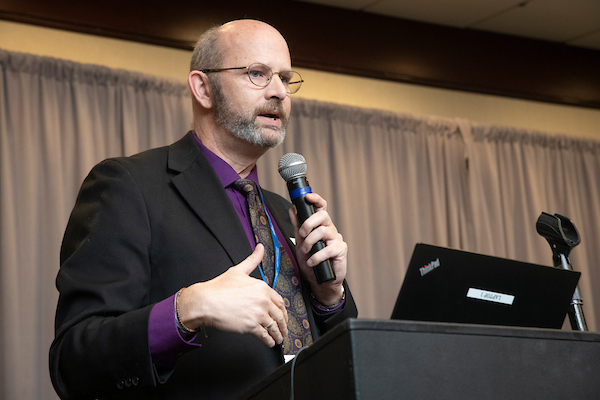|
CIVME Leadership Council to Meet in Australia October 31 - November 1, 2019
|
|
The next regional meeting of the CIVME Council will be held in Brisbane, Australia, October 31st through November 1st, 2019. The council will tour the School of Veterinary Science at Gatton campus and meet with key faculty. AAVMC CEO Dr. Andrew T. Maccabe and AAVMC Director of Strategic Initiatives Ms. Vanessa Mariani will attend the meeting. Mariani will become the AAVMC staff liaison to the AAVMC following the departure of Tony Wynne (see story below).
|
|
Workshop on Fundamentals in Veterinary Education Held in Bologna, Italy
|
The first Italian workshop on "Fundamentals in Veterinary Education" was held in Bologna July 8-11 2019. The meeting was led by Professor Ayona Silva-Fletcher and colleagues from the Royal Veterinary College, University of London, responsible for their pioneering MSc in Veterinary Education. The four-day workshop covered the key principles and practice of veterinary education. The topics covered in the workshop are aligned with the taught component of the first module of the RVC's Postgraduate Certificate Programme in Veterinary Education.
Twenty-six participants from 11 out of the 13 Italian schools of veterinary medicine attended this formative and interactive workshop. The workshop has provided a platform for further events to share best practice and develop novel, evidence-based approaches to veterinary education. These will be organized in the future based on the enthusiastic feedback of participants from all over the Italy.
|
The UK Veterinary Schools Council Veterinary Education Symposium
VetEd Held in Harpenden, England July 3-5, 2019
|
The annual VSC Veterinary Education Symposium was established nearly ten years ago by a group of enthusiastic veterinary educators working from veterinary schools in the UK and Ireland. The symposium takes place over two days in July. VetEd rotates around the schools and aims to be an engaging way for veterinary educators to share ideas and innovations for teaching undergraduate and postgraduate veterinarians and allied professionals.
In 2019, the VetEd Symposium was organised by a committee chaired by Professor Ayona Silva-Fletcher on behalf of the Royal Veterinary College, University of London, with members of the RVC's Lifelong Independent Veterinary Education (LIVE) Centre playing a major role. For convenience of location close to transport hubs, and due to major building works taking place at the RVC's main campus, the conference was hosted at nearby Rothamsted Research in their purpose-built conference centre.
The main theme of VetED 2019 was "Today's Learners, Tomorrow's Professionals." Professor Stephen May of CIVME delivered one of four invited plenary sessions on "Capable, Confident, Healthy and Fulfilled Professionals: Working with the iGeneration," and other speakers addressed in more depth the importance of our memories in learning, student mental health and well-being, and matching science to curricula that meet society's needs.
All participants have come to value the way the symposium's friendly and inviting atmosphere encourages old and young, and early and late career faculty and staff alike to share ideas, innovations, research and best practice in veterinary education, through a range of short communications, posters and interactive workshops.
 This year was no exception! VetEd welcomed 212 participants, from more than 20 countries around the world, including the UK and Ireland, and lively discussions took place in sessions themselves, in the commercial exhibition, around coffee and tea points, and in the glorious July weather on the lawns around Rothamsted's Campus. A memorable social evening allowed attendees to display a full range of practical skills, with a barbecue followed by traditional barn dancing!
For those who missed it, and do not want to miss out again, the next VetEd will take place in July 2020 hosted by the University of Surrey's new veterinary school, which celebrated its first graduates this summer.
|
|
CIVME Bids a Fond Farewell to Tony Wynne - AAVMC Staff Liaison to the Council!
|

An important part of the success of any venture, particularly a new venture, is the quality of its administrative support. All involved in professional life, and in particular university life, will know how the best ideas can flounder if there is no one behind the scenes to "keep the show on the road!" Since its inception, CIVME has been well supported by Mr. Tony Wynne, who has helped maintain CIVME's momentum, and coordinated face-to-face and regular on-line meetings, as well as this newsletter.
CIVME has only been one of Tony's AAVMC responsibilities. He has been with the AAVMC for eleven years and currently serves as the Director of Admissions & Recruitment Affairs. His primary role has been oversight of the Veterinary Medical College Application Service (VMCAS); applicant & advisor development. In this role, he has worked closely with all the AAVMC member institutions, but mostly the VMCAS members on admissions and recruitment initiatives and projects.
Tony is assuming the position of Executive Director of the National Association of Advisors for the Health Professions (NAAHP) beginning October 1st 2019. The NAAHP is a representative voice with health professions schools and their professional associations, undergraduate institutions, and other health professions organizations. The Association promotes high standards for health professions advising at universities and colleges. It assists advisors in fostering the intellectual, personal, and humanistic development of students as they prepare for careers in health professions.
All members of the Council for International Medical Education want to thank Tony for his hard work on behalf of CIVME, and wish him well in his new role.
|
|
Hot Off The Press... Medical Teacher Publishes Paper on EPA's in Veterinary Medical Education
|
As we move to publication of this CIVME newsletter, we have been alerted to the publication on-line, in
Medical Teacher, of a paper on the use of Entrustable Professional Activities (EPAs) in veterinary education. Assessment has been a recurrent theme of discussions in CIVME, with all involved in veterinary education around the world concerned to deliver on their social contract through assuring the standards of veterinary graduates.
EPAs are one approach aimed at answering the challenge of lack of assessment validity levelled at methods that focus on individual competencies in isolation, such as Objective Structured Clinical Examinations (OSCEs). EPAs are workplace-based tasks, such as a primary care consultation or a surgical procedure, that act as frameworks for individual competencies. EPAs are one element from the AAVMC's focus on Competency-based Veterinary Education (CBVE), which has now published three complementary booklets on CBVE, EPAs and assessment criteria in the form of Milestones, available to download as PDFs from the
AAVMC website.
EPAs, in veterinary education, were pioneered by the AVMA-accredited Veterinary School in Utrecht, Netherlands. Predominantly used in residency training in medicine, interest in medical education has now turned to their relevance to assessment in the clinical degree program. This has been the focus of the AAVMC's CBVE working group. The paper is available
here and the bibliography follows.
Laura K. Molgaard, Kristin P. Chaney, Harold G. J. Bok, Emma K. Read, Jennifer L. Hodgson, S. Kathleen Salisbury, Bonnie R. Rush, Jan E. Ilkiw, Stephen A. May, Jared A. Danielson, Jody S. Frost & Susan M. Matthew (2019): Development of core entrustable professional activities linked to a competency-based veterinary education framework,
Medical Teacher.
|
Veterinary Clinical Skills Laboratory at the Faculty of Veterinary Medicine at Jordan University of Science and Technology:
A Giant Step Towards Animal-Friendly Veterinary Education
|
By Zuhair Bani Ismail, Professor, Veterinary Surgery, and Ehab abu-Basha, Professor, Veterinary Pharmacology
The Faculty of Veterinary Medicine at Jordan University of Science and Technology (FVM-JUST) was the first in the region to establish a Veterinary Clinical Skills Center (CSC). The primary objective of this center was to replace live animals with models and simulators for students to practice essential veterinary hands-on skills. Since then, the center has been offering students an advanced self-directed learning environment, and the opportunity to expand their understanding of the interactions between animal and human health.
Training opportunities are offered in the center to students all day long during the week. Students during their free time attend and perform many skills, including identification of different suture materials, suturing techniques, knot tying techniques, identification, handling and care of surgical instruments, hypodermic needles and intravenous catheters. More complex stations are also available including models to practice blood withdrawal from small animals, venous catheterization, preparation and examination of blood smears, and urine and fecal examinations. There are also models to practice basic skills related to fracture repair, using various internal and external fixation techniques, placing distal limb bandages in small and large animals, and a rectal palpation model for bovine and equine reproductive examinations.
In the center, students also have the opportunity to practice and gain experience performing surgical scrubbing, gowning and gloving. The center also contains several models of large and small animal inhalational anesthesia machines that students can gain experience in operating and maintaining. Instructional videos are also available for students, through which they can learn about general physical examination, handling of different animals, performing endoscopy, ultrasound, radiology, and biopsy, business management and communication skills. In addition, the center contains many preserved (whole and dissected) animal specimens and multiple bone specimens that students can use to learn veterinary anatomy.
For assessment purposes, in collaboration with experts from the Royal Veterinary College (RVC), University of London, and as part of the FVM-JUST/RVC twining project, the Faculty has developed a clinical skills list and associated log book that has to be signed off for all students before graduation. A significant portion of this list will be overseen, and certified, by the CSC supervisor. The CSC supervisor has also developed clear instructions for each skill station as a guide to the students while performing the skills. These instruction notes are clearly located next to the relevant skill station in the center. Step-by-step illustrations of appropriate ways of execution of some of the skills have also been placed on the wall above each station.
This is regarded as a good model for our region, and we hope that in addition to having a positive impact on our veterinary school it will be an inspiration and example for others who want to start developing CSLs to enhance competency training and veterinary education in their schools.
To view a manuscript of this article that includes a series of photographs, please
click here.
|
AAVMC Newsletters
Sign up for the newsletter of the Council on International Veterinary Medical Education (CIVME)
here. Read past issues
here.
Sign up to receive the Vet-Med Educator monthly newsletter
here. See past issues
here.
Sign up for the AAVMC's Advocacy newsletter
here. Read past issues
here.
|
|
|
|
|